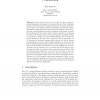Free Online Productivity Tools
i2Speak
i2Symbol
i2OCR
iTex2Img
iWeb2Print
iWeb2Shot
i2Type
iPdf2Split
iPdf2Merge
i2Bopomofo
i2Arabic
i2Style
i2Image
i2PDF
iLatex2Rtf
Sci2ools
145
click to vote
ILP
2004
Springer
2004
Springer
Macro-Operators Revisited in Inductive Logic Programming
For the last ten years a lot of work has been devoted to propositionalization techniques in relational learning. These techniques change the representation of relational problems to attribute-value problems in order to use well-known learning algorithms to solve them. Propositionalization approaches have been successively applied to various problems but are still considered as ad hoc techniques. In this paper, we study these techniques in the larger context of macro-operators as techniques to improve the heuristic search. The macro-operator paradigm enables us to propose a unified view of propositionalization and to discuss its current limitations. We show that a whole new class of approaches can be developed in relational learning which extends the idea of changes of representation to more suited learning languages. As a first step, we propose different languages that provide a better compromise than current propositionalization techniques between the building cost of macrooperator...
| Added | 02 Jul 2010 |
| Updated | 02 Jul 2010 |
| Type | Conference |
| Year | 2004 |
| Where | ILP |
| Authors | Érick Alphonse |
Comments (0)

